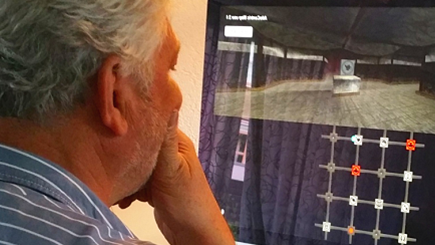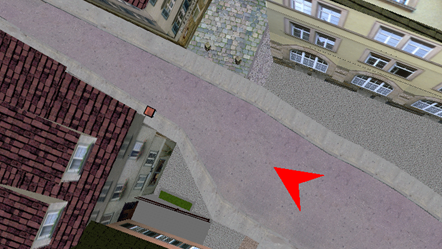
Illusions as the key: how spatial technology can help patients
Spatial technology such as virtual reality can help patients who have difficulty with spatial cognition, for instance if they keep on losing their way. In her inaugural lecture, neuropsychologist Ineke van der Ham will talk about the importance of avatars, the patient experience and room for innovation.
Imagine you are driving at 120 kilometres per hour on the motorway with three small children on the back seat and suddenly don’t know where you are or how to proceed. Panic sets in: Which exit should you take and where were you going again? Almost 15 years ago Van der Ham came into contact with a seemingly healthy young woman who would lose her way from one moment to the next.
Simulating getting lost
The woman had had a stroke but didn’t know it because apart from getting lost there were no noticeable effects. ‘The neurological tests available couldn’t confirm her condition. This could be solving a maze on a piece of paper. That’s much too small. For people who have difficulty with their practical navigation skills, it is important to simulate the situations when they get lost. They have to be able to walk around in a realistically large space.’
Serious game
Technology can help create this larger space and make it suited to research. Van der Ham and her team developed a serious game to test patients’ navigation skills. Players have to find their way through underground corridors populated by mythological figures. But the game’s design missed the mark.
-

A research participant concentrating while taking a navigation test -

A realistic spatial illusion, such as a city street here
‘It’s really important that the virtual environment looks familiar. The illusion has to correspond with what people know.’
‘The mythological world didn’t match the patients’ own worlds at all, so the test didn’t work. It’s really important that the virtual environment looks familiar. The illusion has to correspond with what people know.’ A second design with a maze of hospital corridors and streets in a realistic housing estate did prove to be a success. ‘We have to understand how users experience the technology, particularly if you work with vulnerable groups. There’s still a gap there.’
Avatars as placebo effect
Van der Ham believes spatial technology can play a big role in patient treatment. She is particularly interested in using avatars, a digital self. Research has shown that women perform better in maths tests if they see a male avatar. Their performance drops if they see a female avatar. The reverse is also true: men with a female avatar perform worse in the test than they do with a male avatar. ‘Stereotypical beliefs get in our way. But this also shows that we may be able to use avatars to create a cognitive placebo effect.’
A placebo effect that must then also hold up in the real world. For Van der Ham there is no question that her research must be applicable. ‘Real innovation is only achieved when ideas are actually transformed into using the conceived solution. I am very close to the implementation of my research and hear people say: “That’s great. You’re the first to do this.” That’s really weird.’
‘I’m not the kind of researcher to win loads of major personal grants but I’m a professor now anyway’
She therefore cannot emphasise enough how important it is that researchers are facilitated in making research applicable. Different forms of assessment, as in the Recognition and Rewards programme, are crucial to this. ‘I’m not the kind of researcher to win loads of major personal grants but I’m a professor now anyway. Some researchers are good at teaching, others at seeking publicity and others again at securing funding. Universities really should look at the total package.’

Experience an illusion
Back to the illusion: how is it to walk on a plank over a deep abyss but then on the ground floor of the Academy Building? How is it to stand in an impossible space? And how does an anatomy lesson work in virtual reality? Van der Ham will show visitors to her inaugural lecture in style how strong illusions can be.
Ineke van der Ham will give her inaugural lecture An Illusion Richer on 1 December at 16.00. Visitors can come to the Illusion Lab on the ground floor of the Academy Building from 15.00.
Test: Tim Senden
Main photo: Pixabay.com/Pexels
